Customer feedback is really important, and that’s putting it mildly.
A few well-chosen words in a review can do more to sway people than a whole website. A customer’s decision to buy from a competitor over you may hinge on a single-star, or even a half-star, difference in ratings. Reviews, mainly, are the most crucial component in local SEO rankings.
Reviews are essential when it comes to improving your standing and reputation online. However, they are not the simplest to obtain naturally. But the question is how to ask for a review from clients to earn those.
Thankfully, statistics show that happy clients are willing to give a few comments and rate your product or service. This means that with the right prodding at the right time, you’ll get those positive feedbacks that can boost your site online.
Here is a quick guide to requesting positive client reviews, with some examples to better help you.
Importance of Customer Reviews for Businesses
Reviews from satisfied customers are vital to any business because they reveal the tastes and opinions of the target market.
A survey conducted by BrightLocal found that 87% of consumers look at online reviews before making a purchase decision.
For instance, a Harvard Business School (HBS) study discovered that Yelp reviews affect how many people see a business, affecting the number of leads and sales a business receives.
Getting customers to write reviews takes time, energy, and a well-thought-out plan on the part of businesses.
A 2022 study by BrightLocal found that only 26% of customers asked to leave a review do so. Staff training to cleverly ask for reviews from clients would be a tremendous boost. This could lead to a rise in positive reviews.
Interesting read: The Complete Guide to Client Retention Strategy for Marketing Agency
6 Tips on How to Ask for a Review From Clients
1. Be Transparent When You Ask for Reviews From Clients
It’s important to be up-front with customers about the feedback request and its reasons. If clients appreciate the significance of their feedback, they are more likely to provide it in the form of reviews. Being open and honest with your customers is a great way to earn their trust and demonstrate that you value their feedback.
E-commerce giant Amazon is famous for its open feedback policy. Patrons are encouraged to leave reviews of purchased products. They also monitor the reviews to ensure authenticity and provide clear guidelines for a helpful review. This openness makes consumers view Amazon as a reliable resource for product details.
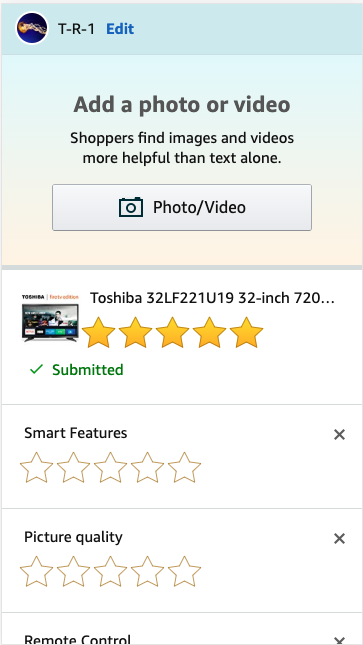
To implement this suggestion, clarify why you’re asking for feedback and how it will be used to better your company. It is also a good idea to outline the characteristics of a constructive review and encourage customers to be open and forthright in their comments. Establishing your company as trustworthy and customer-focused begins with being open and honest with them.
2. Use the Power of Google My Business
Google My Business (GMB) is a useful free tool for businesses to improve their online presence and gain visibility on Google Search and Maps. It allows businesses to share important details such as contact information and business hours.
GMB is more than just a directory; it enables businesses to easily request and respond to customer feedback, helping them build trust with their customers.
Using GMB’s “Request a Review” feature, businesses can solicit reviews from satisfied customers and showcase their average rating on their website and social media pages. Doing so can improve their online reputation, attract more customers, and receive more positive reviews.
3. Aim for Industry-Specific Review Sites
As a business owner, it’s essential to recognize the importance of utilizing both general-purpose review sites and niche-specific platforms to manage your company’s online reputation. While sites like Yelp, Google, and Facebook are well-known and widely used, niche-specific review sites that cater to your particular industry or products can be equally valuable.
For instance, OpenTable and Zomato are popular review sites for restaurants, while WeddingWire and The Knot are helpful for photographers specializing in wedding photography. By leveraging these specialized review sites, businesses can attract high-quality leads, increase brand visibility, and improve the quality of traffic to their website.
Through active engagement and effective use of review sites, businesses can build trust with their customers, increase sales, and enhance their online reputation.
4. Grow Your Presence on Social Media
When it comes to social media, businesses must select the right platforms for their target audience. Each platform attracts different demographics, so it’s essential to focus on the ones where your customers spend the most time.
For instance, Instagram and Snapchat may be prioritized by companies targeting young adults, while LinkedIn may be more effective for companies targeting other businesses.
Sharing positive reviews on social media provides social proof and encourages other customers to leave their feedback. It’s important to acknowledge publicly and thank reviewers by tagging them in posts to show appreciation and build a stronger relationship with them.
To promote your reviews, use social media to reach your target audience and encourage them to leave feedback. Businesses can create posts asking customers for reviews, link to review sites, or provide instructions on leaving a review. By utilizing social media platforms, businesses can effectively spread the word about their reviews and strengthen their online reputation.
Look at this local insurance agency as an example.

In this simple post, they ask their customers to show them some love by leaving them a review and including a link to the review page.
We highly recommend sharing some of the reviews you receive on your social media, too, as this local business does below.

This shows your appreciation for their feedback and encourages others to do the same.
5. Using Emails/Text Messages as a Medium
In today’s digital age, emails and text messages are powerful tools that businesses can use to request feedback from their customers. By reaching out to customers through these channels, businesses can make it easy and convenient for customers to share their feedback.
One of the significant advantages of email and SMS marketing is their ability to personalize messages for each customer. By tailoring messages to the specific needs of individual customers, businesses can provide a more personalized experience that leaves a lasting impression. This personalized approach can result in higher customer satisfaction and more positive feedback.
Moreover, businesses can streamline their communication and save time and resources by automating their email and SMS messages. Automated messages can be scheduled to send at the optimal time, allowing businesses to solicit feedback from customers when they are most likely to respond positively.
Here is a template you can use to request reviews from clients by personalizing it:
Dear [first name]
Thank you for your recent purchase. We hope you love it! Would you consider leaving us a [platform] review if you do? This helps us to continue providing great products and helps others like you to find us and make confident [item] decisions.
Thank you in advance!
Below is another example to request reviews from clients via text messages.
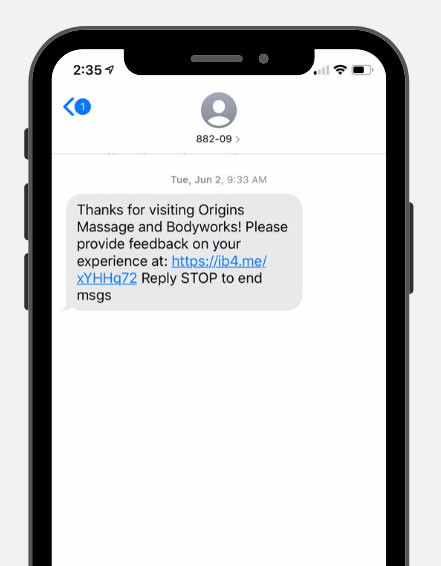
6. Create a Separate Landing Page for Collecting Reviews
A dedicated review page serves as a platform for businesses to showcase their positive reviews and build trust with potential customers. By displaying a selection of reviews on the page, businesses can demonstrate social proof and provide evidence of their reputation and quality of service.
Another benefit of a dedicated review page is that it can help businesses better manage their online reputation. By directing customers to leave reviews on a specific page, businesses can better monitor and respond to feedback. They can also use the page as a tool to address any negative feedback and demonstrate their commitment to customer satisfaction.
Furthermore, a dedicated review page can provide valuable insights into customer satisfaction and feedback. By analyzing the data collected from the page, businesses can better understand their customers’ needs and preferences and use this information to improve their products and services.
The image below is an excellent example of a website’s landing page for collecting reviews.
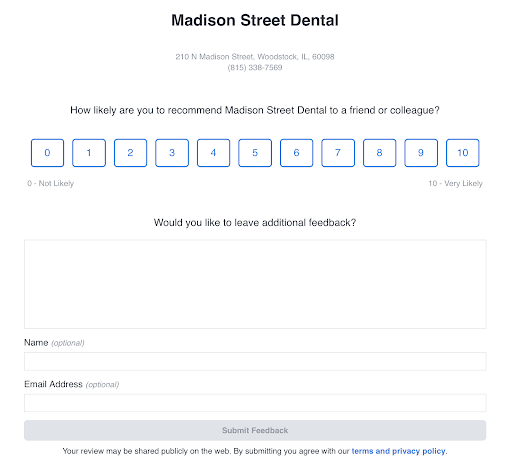
Take advantage of SocialPilot’s social inbox to efficiently manage reviews from different platforms in one place. Setting up review feeds for each platform allows you to respond quickly to reviews and keep track of your online reputation.
Use the scheduling feature to set up automatic thank-you messages to customers who leave positive reviews and quickly address negative reviews with timely responses. With SocialPilot’s social inbox, you can streamline your review management process and improve customer engagement.
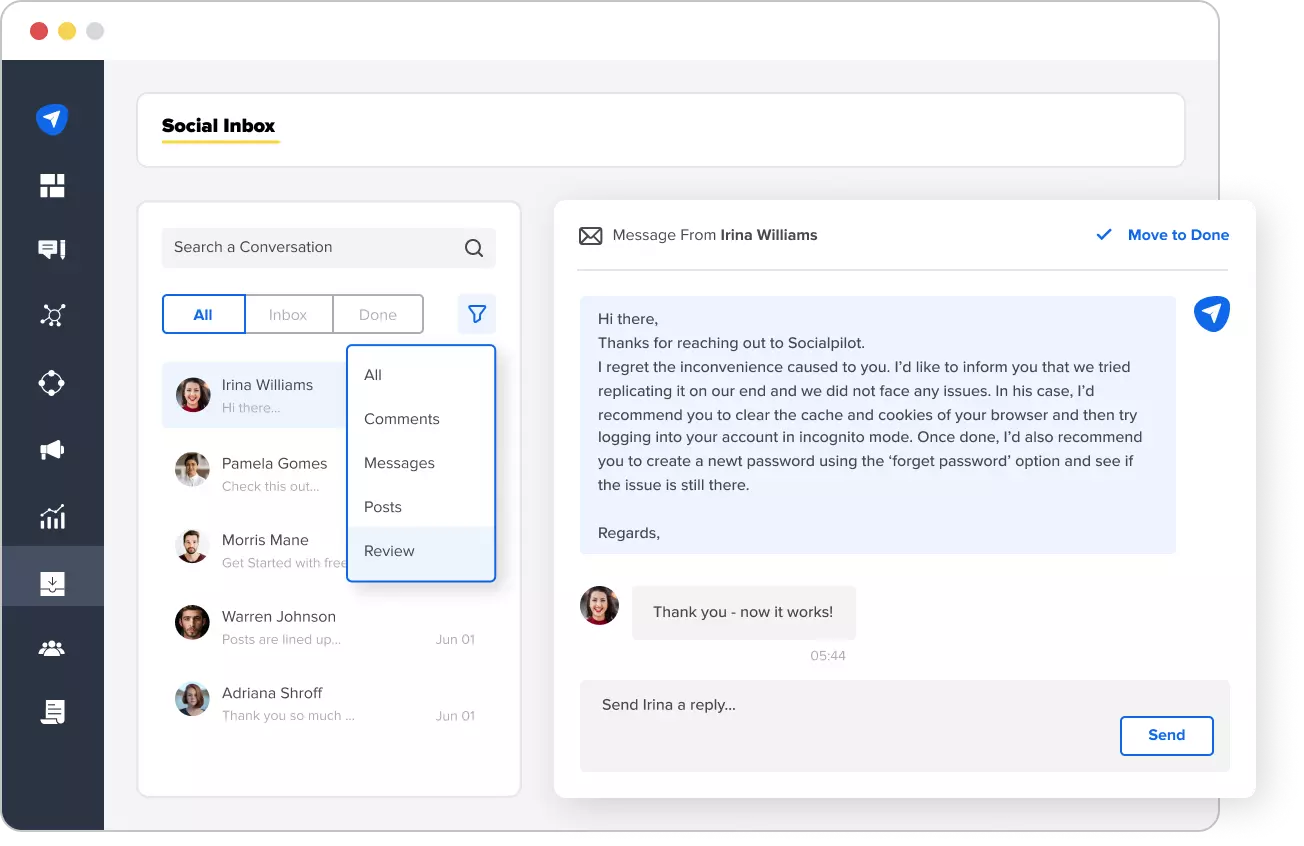
3 Benefits of Requesting Reviews from Clients
Improved Reputation
A company’s reputation is critical to its success, and an essential factor customers consider when deciding whether to do business with it. A positive reputation can help a business stand out from its competitors and build customer trust, while a negative reputation can lead to losing customers and revenue.
Requesting client reviews can help improve a business’s reputation by increasing the number of positive reviews online. A survey found that 90% of consumers rely on online reviews as much as they would on personal recommendations.
Positive reviews can build customer trust and encourage potential customers to choose a particular business over its competitors. Additionally, having more reviews can make a business appear more legitimate and established, enhancing its reputation.
Moreover, a business can demonstrate its commitment to customer satisfaction by requesting client reviews. By responding to reviews and addressing customer concerns or issues, a business can show that it values feedback and is dedicated to providing a positive customer experience. This helps build trust with existing and potential customers, increasing loyalty and repeat business.
Better Outreach
In the digital age, businesses must prioritize their online presence to reach potential customers effectively. One way to increase visibility is by soliciting reviews from existing clients.
Positive reviews can significantly impact a business’s reputation and attract more customers. They also improve search engine optimization (SEO) by increasing the quantity and quality of reviews that search engines consider when ranking results.
Businesses can expand their customer base by promoting reviews on their website and social media channels, showcasing their customers’ positive experiences. Making it easier for customers to leave reviews and promoting them on relevant channels can help businesses build a positive online reputation, enhance SEO, and increase revenue.
Better Online Presence
In today’s digital age, businesses must have a robust online presence. Requesting reviews from satisfied customers is a great way to increase your brand’s exposure and credibility online.
To ascertain whether or not a company is worth its money, many people shopping online read customer reviews. 87% of consumers look at online reviews before visiting a local business, and 88% trust online reviews just as much as personal recommendations.
Companies can improve the quantity and quality of their reviews by asking for customer feedback. If you do this, you may see an increase in your site’s popularity and search engine rankings. Customers are more likely to choose a company based on positive reviews, which can increase sales and revenue.
Overtone, a hair care brand, is a good example because it has used customer reviews to boost its online presence. They have a system set up in tandem with TrustPilot that lets buyers rate and review products on their site, and those ratings and reviews are featured prominently on the relevant product pages.
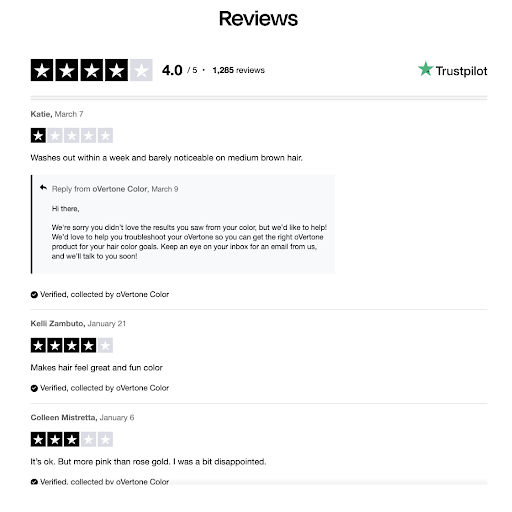
Overtone claims this is due to the increased social proof provided by customer reviews, which has increased conversion rates.
Interesting read: 10 Agency Project Management Tools for 2023
Why Should You Never Buy or Incentivize Reviews?
Although offering monetary or other incentives in exchange for positive reviews may seem like a quick and easy way to boost a company’s online reputation, you should avoid this as much as possible. The subsequent consequences are as a result:
It Violates Ethical Principles
When reviews are bought or offered in exchange for free products/services, both the reviewer’s and the reviewee’s honesty are compromised. Reviews should authentically express the reviewer’s opinion after using the product or service. It isn’t suitable for business and online review platforms when companies deceive potential customers by altering reviews.
It Damages Your Brand Reputation
Purchasing or incentivizing reviews may help a company temporarily, but it can hurt its reputation in the long run. Customers who feel duped by fake reviews are more likely to stop doing business with the company altogether, which can result in bad press, customer churn, and a drop in revenue.
It’s Illegal and Can Lead to Severe Consequences
In many nations, buying or incentivizing reviews is prohibited and carries severe penalties, including fines or criminal charges. Also, it’s against the rules of many review sites, which could lead to the removal of reviews, suspension of the account, or even termination of the business’s account. The review site or the deceived customers may take legal action in the worst-case scenario.
Conclusion
Customer reviews are a significant factor in a company’s overall success. Positive reviews can boost a business’s online reputation, increase sales, and strengthen customer loyalty by giving prospective customers vital information about the quality of a product or service.
Businesses can streamline their review request and response processes by implementing the expert advice in this article.
Businesses can use these guidelines and automated review request tools like SocialPilot’s Social Inbox to boost their online visibility and reputation to keep up with the competition. For this reason, businesses should actively seek customer feedback and adopt these tactics.



